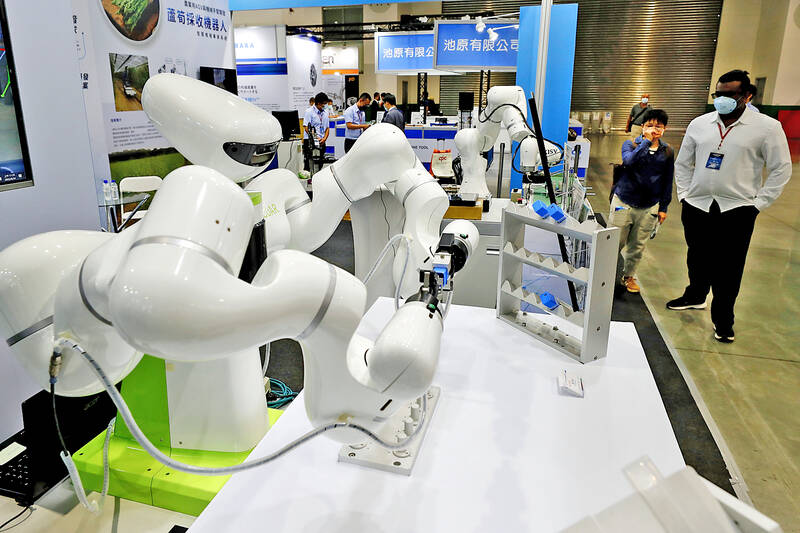Taiwanese firms last month turned more conservative about the local economy due to inflationary pressures, with the climate gauge for the manufacturing industry falling to 86.73, the lowest since June 2020, the Taiwan Institute of Economic Research (TIER, 台灣經濟研究院) said yesterday.
The figure fell from 88.08 a month earlier to post its eight consecutive monthly decline, the Taipei-based think tank told a videoconference, citing the results of its monthly survey.
Only 17.2 percent of the polled manufacturers were optimistic about their business prospects in the coming six months, down from 20.1 percent a month earlier, the institute said.

Photo: Ritchie B. Tongo, EPA-EFE
Companies operating in the fields of plastics, chemicals, synthetic fibers, steel and metal, glass, and information technology equipment were more conservative about their business prospects over the period, it said.
About 70 percent of steelmakers expressed pessimism, citing weaker market demand and a correction in raw material prices.
The survey found that about 60 percent of chemical makers were gloomy, as COVID-19 lockdowns in China battered demand, while corrections in oil prices trimmed their profits.
Despite slowing sales of consumer electronics, electronics manufacturers remained upbeat on the back of strong demand for automotive electronics, high-performance computing devices and semiconductors, the institute said.
The depreciation of the New Taiwan dollar against the US dollar also bolstered electronic companies’ sales performance, it added.
However, about 40 percent of the polled electronics manufacturers were conservative about their business outlook over the next six months, citing a shortage of chips, rising inventories and high inflation, the institute said.
The climate gauge for the service sector fell to 95.6 from 97.2 a month earlier, as transportation, logistics and warehousing companies turned conservative for the next six months, the institute said.
Seventy percent of the polled retailers had a neutral outlook for the next six months, due to concerns that high inflation and uncertainty in the global economy would weigh on consumer spending, it said.
Pessimistic sentiment also affected the construction sector, with the business measure falling to 93.12 from 96.61 a month earlier, the institute said.
In contrast, 80 percent of restaurant operators and tourism companies said they were upbeat for the next six months amid a planned easing of border restrictions, the institute said.

PATENTS: MediaTek Inc said it would not comment on ongoing legal cases, but does not expect the legal action by Huawei to affect its business operations Smartphone integrated chips designer MediaTek Inc (聯發科) on Friday said that a lawsuit filed by Chinese smartphone brand Huawei Technologies Co (華為) over alleged patent infringements would have little impact on its operations. In an announcement posted on the Taiwan Stock Exchange, MediaTek said that it would not comment on an ongoing legal case. However, the company said that Huawei’s legal action would have little impact on its operations. MediaTek’s statement came after China-based PRIP Research said on Thursday that Huawei filed a lawsuit with a Chinese district court claiming that MediaTek infringed on its patents. The infringement mentioned in the lawsuit likely involved

Taipei is today suspending work, classes and its US$2.4 trillion stock market as Typhoon Gaemi approaches Taiwan with strong winds and heavy rain. The nation is not conducting securities, currency or fixed income trading, statements from its stock and currency exchanges said. Authorities had yesterday issued a warning that the storm could affect people on land and canceled some ship crossings and domestic flights. Taiwan Semiconductor Manufacturing Co (TSMC, 台積電) expects its local chipmaking fabs to maintain normal production, the company said in an e-mailed statement. The main chipmaker for Apple Inc and Nvidia Corp said it has activated routine typhoon alert

GROWTH: TSMC increased its projected revenue growth for this year to more than 25 percent, citing stronger-than-expected demand for AI devices and smartphones The Taiwan Institute of Economic Research (TIER, 台灣經濟研究院) yesterday raised its forecast for Taiwan’s GDP growth this year from 3.29 percent to 3.85 percent, as exports and private investment recovered faster than it predicted three months ago. The Taipei-based think tank also expects that Taiwan would see a 8.19 percent increase in exports this year, better than the 7.55 percent it projected in April, as US technology giants spent more money on artificial intelligence (AI) infrastructure and development. “There will be more AI servers going forward, but it remains to be seen if the momentum would extend to personal computers, smartphones and

Catastrophic computer outages caused by a software update from one company have once again exposed the dangers of global technological dependence on a handful of players, experts said on Friday. A flawed update sent out by the little-known security firm CrowdStrike Holdings Inc brought airlines, TV stations and myriad other aspects of daily life to a standstill. The outages affected companies or individuals that use CrowdStrike on the Microsoft Inc’s Windows platform. When they applied the update, the incompatible software crashed computers into a frozen state known as the “blue screen of death.” “Today CrowdStrike has become a household name, but not in